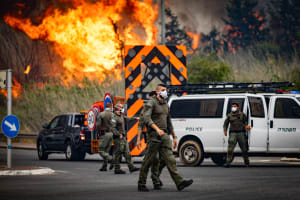Thousands of high-tech experts assist in search for missing Israelis
Tech are also volunteering their time to combat Hamas' false accusations against Israel

Thousands of Israeli high-tech professionals are volunteering by leading the way in the daunting task of identifying and locating the many Israeli and international hostages held by the Hamas terror group in Gaza. Another important task is to prevent the spread of fake news and widespread misinformation about the war, which Hamas forced upon the Jewish state and its civilian population when it launched its brutal assault on Oct. 7.
The Start-Up Nation Israel is known around the world for its technological innovation and improvisation capabilities. The Humanitarian Machine Learning (HML) center was established mere days after the unprecedented Hamas attack. It consists of IT experts, cyber executives, developers and experienced content creators from Israel and many other countries who want to help.
Many Israeli high-tech executives, who were until recently protesting against the Netanyahu government’s judicial reforms are now carefully analyzing online footage of the terror activity on Oct. 7 in an effort to establish, with certainty, the identity of the more than the 200 missing persons since the Hamas invaded Israel two weeks ago.
Yuval Keshtcher, a former IDF combat soldier, is one of the tech professionals now putting their regular jobs on hold in order to Israel during this challenging time. Keshtcher admitted that chaos and uncertainty has complicated the identification process.
“There was so much chaos due to the surprising nature of events,” Keshtcher said. “We understood that there were lots of missing people, especially from the rave, and lots of Whatsapp groups for missing people. The first thing that I wanted to do was try to organize the chaos,” he added.
The tech volunteers are using sophisticated software to identify the missing individuals. The techniques include the use of audio and video analysis, as well as photo recognition. The tech experts are correlating the identification of missing individuals with the creation of detailed maps of the densely populated Gaza Strip and its maze of neighborhoods to facilitate upcoming rescue attempts inside the Strip.
At the same time, Hamas is waging an unprecedented propaganda and disinformation war against Israel in an effort to turn world opinion against Israel. Tech experts are tackling the propaganda by actively seeking to prevent the spread of falsehoods and misinformation on social media.
Hamas falsely accused Israel this week of causing a lethal explosion at the Al-Ma’amadani Hospital in Gaza.
The IDF and Israeli tech experts soon after rebuked the lie by presenting documented evidence that the blast was in fact caused by a misfired Palestinian Islamic Jihad rocket that was aimed at Israeli civilians.
However, much of the media and general public across the Middle East continue to blame the Jewish state for the lethal blast, which resulted in civilian deaths in Gaza.
On Friday, the Israeli army rejected another accusation that it had “targeted” a Greek Orthodox Church in Gaza on Thursday.
Lt.-Col. Jonathan Conricus, the international spokesman for the Israel Defense Forces, told ALL ARAB NEWS that Israel did not target the Greek church in Gaza.
“The IDF did not target the church,” Conricus said.
“The church was unfortunately hit by the blast since the target was relatively close to the church,” the IDF added.
"In flagrant violation of international law, Hamas terrorists are deliberately operating from densely populated areas, thereby endangering the lives of civilian Gazans in hospitals, churches, mosques and schools.

The All Israel News Staff is a team of journalists in Israel.














